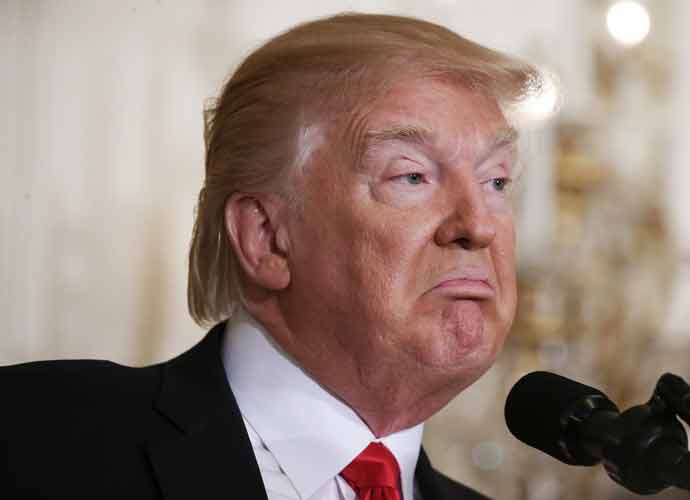

WASHINGTON, DC - FEBRUARY 16: U.S. President Donald Trump stands during a news conference announcing Alexander Acosta as the new Labor Secretary nominee in the East Room at the White House on February 16, 2017 in Washington, DC. The announcement comes a day after Andrew Puzder withdrew his nomination. (Image: Getty)
President Donald Trump has once again mused about the possibility of issuing a self-pardon, as his presidential term is closing to an end.
Trump has reportedly inquired about the legal ramifications of issuing a pardon to himself, an unprecedented move. It is not clear if he has discussed pardoning himself since the Jan. 6 pro-Trump riot at the Capitol.
When he leaves office, Trump will lose presidential immunity.
Trump could potentially face federal charges related to inciting the violent mob.
Subscribe to our free weekly newsletter!
A week of political news in your in-box.
We find the news you need to know, so you don't have to.
“We are looking at all actors, not only the people who went into the building,” said Michael Sherwin, the top federal prosecutor in Washington.
The hypothetical pardon would not prevent Trump from being prosecuted at the state level. The ongoing criminal probe by the Manhattan district attorney’s office into possible bank and insurance fraud by Trump is one example of potential criminal charges the president would not be exempt from, even if he pardoned himself.
Trump has maintained throughout his presidency that he has the authority to pardon himself, though legal scholars are skeptical he would be allowed to do so.
“As has been stated by numerous legal scholars, I have the absolute right to PARDON myself, but why would I do that when I have done nothing wrong?” he tweeted in 2018.
Columbia Law School professor Philip Bobbitt wrote in Lawfare in 2018 that a presidential pardon to one’s self would not be executed “faithfully,” and thus would be unconstitutional.
“When the president pardons himself, he assumes a power that is incompatible with, rather than a supplement to, the application of the federal criminal law,” Bobbitt wrote. “That is because as chief law enforcement officer, he could put himself beyond the applicable law simply by withholding his consent to his prosecution by the department he controls while he is president—and then assure himself that he could not be convicted after his term ended—or after impeachment—because he could pardon himself prospectively.”
Following Richard Nixon’s impeachment, the Justice Department issued a brief memo stating that “it would seem” that presidents cannot pardon themselves “under the fundamental rule that no one may be a judge in his own case.” However, that memo is not legally binding and could not stop a president from trying to issue a self-pardon.
“The Biden Justice Department will not want to acquiesce in a Trump self-pardon, which implies that the president is literally above federal law,” Jack Goldsmith, a former top Justice Department official in the George W. Bush administration, told the Times.
Goldsmith added: “Only a court can invalidate a self-pardon, and it can only do so if the Biden administration brings a case against Trump. A Trump self-pardon would thus make it more likely the Biden team prosecutes Trump for crimes committed in office.”
Tesla CEO Elon Musk has apologized for his public falling out with President Donald Trump.…
Sen. Chris Murphy (D-Connecticut) has launched a new political action committee (PAC), the American Mobilization…
Brit Hume, the Fox News chief political analyst, contradicted President Donald Trump's statement to the…
FBI Director Kash Patel has revealed that his home was "swatted" last week. "As Director…
Commerce Secretary Howard Lutnick announced the launch of the $5 million "gold card" U.S. residency…
In a new study, nearly 50% of Tesla owners report their vehicles have been vandalized,…